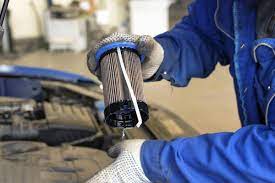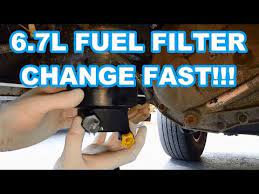Misfires Unveiled: The Role of a Clogged Fuel Filter
If you’re experiencing a rough running engine, loss of power, or even engine stalling, there’s a good chance that your fuel filter could be to blame. In this blog post, we’ll explore the importance of the fuel filter and how it affects your engine’s performance. We’ll discuss the symptoms of a clogged filter, the effects it can have on your engine, and how to diagnose misfires. Additionally, we’ll cover the process of replacing the fuel filter, so you can keep your engine running smoothly. Understanding and maintaining your fuel filter is key to keeping your engine running at its best.
Understanding Misfires
When it comes to the performance of a vehicle’s engine, one common issue that many drivers encounter is a misfire. A misfire occurs when the fuel in the engine fails to ignite at the proper time, causing a disruption in the engine’s normal operation. This can lead to a number of symptoms, including rough idling, reduced fuel efficiency, and a noticeable decrease in overall performance.
One of the potential causes of a misfire is a clogged fuel filter. A fuel filter is responsible for removing impurities from the gasoline before it reaches the engine. Over time, the filter can become clogged with dirt, debris, and other contaminants, which can restrict the flow of fuel to the engine. This restriction can lead to a lean air-fuel mixture, which in turn can cause a misfire to occur.
In some cases, a clogged fuel filter can be a contributing factor to a misfire. If the filter becomes so clogged that it restricts the flow of fuel to the engine, it can result in a lack of proper fuel delivery to the combustion chamber. This can disrupt the normal ignition process and lead to a misfire. Therefore, it is important to regularly check and replace the fuel filter as part of routine vehicle maintenance to avoid potential misfire issues.
Importance Of Fuel Filter
The fuel filter is a vital component in a vehicle’s fuel system. It plays a crucial role in ensuring that the fuel reaching the engine is clean and free of contaminants. A clogged fuel filter can have a significant impact on the performance and efficiency of the engine, making it essential to understand the importance of regular maintenance and replacement of this component.
One of the key functions of the fuel filter is to prevent impurities and debris from entering the engine. Over time, dirt, rust, and other particles can accumulate in the fuel tank, and if not filtered out, they can potentially cause damage to the internal components of the engine. A clogged fuel filter can disrupt the flow of fuel to the engine, leading to a variety of performance issues, including rough idling, hesitation, and misfires. This underscores the critical role that the fuel filter plays in maintaining the overall health of the engine.
Regular inspection and replacement of the fuel filter is essential in ensuring optimal engine performance. A clogged fuel filter can restrict the flow of fuel, leading to a lean air-fuel mixture, which in turn can cause misfires and reduced power output. By replacing the fuel filter at recommended intervals, drivers can prevent potential damage to the fuel system and ensure that the engine operates at peak efficiency.
Symptoms Of Clogged Filter
One of the most common issues that can occur with a vehicle’s fuel system is a clogged fuel filter. This can have a major impact on the performance of the engine and can lead to a variety of symptoms that can be frustrating and potentially costly to repair. Understanding the symptoms of a clogged fuel filter can help you identify the issue early and take the necessary steps to address it before it causes further damage to your vehicle.
One of the symptoms of a clogged fuel filter is engine misfires. When the fuel filter becomes clogged, it can restrict the flow of fuel to the engine, leading to a lean air-fuel mixture. This can result in a misfire, which can cause the engine to run rough, idle inconsistently, or even stall. Additionally, a clogged fuel filter can cause the engine to hesitate or stumble during acceleration, as the restricted fuel flow may not be able to keep up with the demands of the engine.
Another potential symptom of a clogged fuel filter is a noticeable decrease in engine performance. A clogged filter can restrict the flow of fuel to the engine, leading to reduced power and overall performance. This can be especially noticeable during heavy loads or high-speed driving. If left unaddressed, a clogged fuel filter can lead to more serious issues with the fuel system and engine, potentially resulting in costly repairs. Therefore, it is important to be aware of the symptoms of a clogged fuel filter and address the issue promptly to prevent further damage to your vehicle.
Effects On Engine Performance
When it comes to keeping your engine running smoothly, the fuel filter plays a crucial role in ensuring optimal performance. A clogged fuel filter can have a direct impact on the engine’s overall performance, causing a variety of issues that can be detrimental to the vehicle’s operation.
One of the most significant effects of a clogged fuel filter is a decrease in engine power. As the filter becomes obstructed with debris and contaminants, the flow of fuel to the engine is restricted, leading to a reduction in power output. This can result in sluggish acceleration, poor towing capabilities, and overall reduced performance.
In addition to diminished power, a clogged fuel filter can also contribute to engine misfires. When the filter becomes clogged, it can restrict the amount of fuel that reaches the engine, resulting in an uneven fuel mixture. This imbalance can lead to misfires, hesitation, and rough idling, all of which can have a negative impact on the overall performance of the engine.
Diagnosing Misfires
When it comes to the performance of your vehicle, misfires can be a significant concern. A misfire occurs when the fuel in your car’s engine fails to ignite at the proper time, causing a disruption in the engine’s normal operation. This can lead to a range of issues, including poor fuel efficiency, rough idling, and potential damage to the engine over time.
One potential cause of misfires can be a clogged fuel filter. A fuel filter that has become clogged can restrict the flow of fuel to the engine, leading to a lean air-fuel mixture and potential misfires. This is because a clogged fuel filter can prevent an adequate amount of fuel from reaching the engine, resulting in ignition problems and decreased performance.
Diagnosing misfires can be a complex and time-consuming process, as there are multiple factors that can contribute to this issue. However, a thorough inspection of the fuel filter can provide valuable insights into the root cause of the problem. If a clogged fuel filter is identified as the culprit, it should be promptly replaced to restore proper fuel flow and prevent future misfires.
Replacing The Fuel Filter
When it comes to maintaining the health and performance of your vehicle, the fuel filter plays a crucial role. Over time, the fuel filter can become clogged with dirt, debris, and other contaminants, which can have a negative impact on the engine’s performance. One question that often arises is, can a clogged fuel filter cause a misfire? The answer is yes – a clogged fuel filter can restrict the flow of fuel to the engine, leading to a lean air-fuel mixture and potentially causing misfires.
One of the symptoms of a clogged fuel filter is a rough idle or hesitation during acceleration. This is because the engine is not receiving an adequate supply of fuel, which can lead to misfires and a decrease in performance. In severe cases, a clogged fuel filter can even prevent the engine from starting altogether. This is why it’s important to regularly inspect and replace the fuel filter as part of your vehicle’s routine maintenance.
When it comes to replacing the fuel filter, it’s important to follow the manufacturer’s recommended maintenance schedule. Typically, the fuel filter should be replaced every 30,000 miles, but this can vary depending on the make and model of your vehicle. Replacing the fuel filter is a relatively simple and inexpensive procedure, but it can have a big impact on your vehicle’s performance and reliability.
Frequently Asked Questions
Why do misfires occur?
Misfires occur when there is a problem with the ignition, fuel, or compression in the engine, causing a lack of power and a rough running engine.
What is the importance of a fuel filter?
A fuel filter is important for removing impurities and contaminants from the fuel before it reaches the engine, preventing damage and maintaining optimum performance.
What are the symptoms of a clogged fuel filter?
Symptoms of a clogged fuel filter include engine hesitation, stalling, difficulty starting, and a decrease in fuel efficiency.
What are the effects on engine performance from a clogged fuel filter?
A clogged fuel filter can lead to poor acceleration, rough idling, and ultimately, engine failure if not addressed promptly.
How can misfires be diagnosed?
Misfires can be diagnosed through a process of elimination, including checking the ignition system, fuel system, and engine compression to pinpoint the cause.
How often should the fuel filter be replaced?
The fuel filter should be replaced according to the manufacturer’s recommendation, typically every 20,000 to 30,000 miles, to ensure proper engine performance.
How can the fuel filter be replaced?
The fuel filter can be replaced by locating it in the fuel line, relieving fuel pressure, removing the old filter, installing the new filter, and re-pressurizing the fuel system.
Why do misfires occur?
Misfires occur when there is a problem with the ignition, fuel, or compression in the engine, causing a lack of power and a rough running engine.
What is the importance of a fuel filter?
A fuel filter is important for removing impurities and contaminants from the fuel before it reaches the engine, preventing damage and maintaining optimum performance.
What are the symptoms of a clogged fuel filter?
Symptoms of a clogged fuel filter include engine hesitation, stalling, difficulty starting, and a decrease in fuel efficiency.
What are the effects on engine performance from a clogged fuel filter?
A clogged fuel filter can lead to poor acceleration, rough idling, and ultimately, engine failure if not addressed promptly.
How can misfires be diagnosed?
Misfires can be diagnosed through a process of elimination, including checking the ignition system, fuel system, and engine compression to pinpoint the cause.
How often should the fuel filter be replaced?
The fuel filter should be replaced according to the manufacturer’s recommendation, typically every 20,000 to 30,000 miles, to ensure proper engine performance.
How can the fuel filter be replaced?
The fuel filter can be replaced by locating it in the fuel line, relieving fuel pressure, removing the old filter, installing the new filter, and re-pressurizing the fuel system.




Post Comment